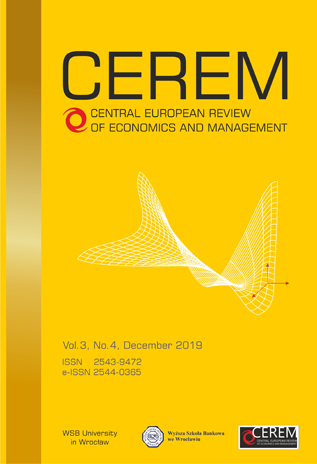Sustainability of the Bulgarian food processing industry
DOI:
https://doi.org/10.29015/cerem.745Abstrakt
Abstract:
Bulgarian agricultural sector underwent a transformation during the last decade of the 20th century, and its economic impact has lessened as a result. After the accession of the country to the European Union in 2007 Bulgarian agricultural product had uninterrupted access to the common market and most producers has oriented their production towards it. As a result Bulgarian food processing industry was put under great stress, due to its supply chain being greatly compromised.
Aim: To investigate the sustainability of the functioning and development of the food processing industry in Bulgaria.
In order to achieve this goal, the following tasks are solved:
- to analyze the state and development of Bulgaria food industry;
- to examine the problems and prospects for its sustainable functioning.
Design / Research methods: The methods used to solve the tasks are: analysis and synthesis, systematic and structural approach, statistical calculations.
Conclusions / findings: The expectations of the study are that both positive and negative trends in the sustainable functioning of the food processing industry in Bulgaria will be identified.
Originality / value of the article: The prospects for the sustainable development of the food processing industry are in direct correlation and dependence not just on the opportunities for development of foreign markets as a result of the liberalization and globalization of trade, but also on the preservation of its positions in our national market.
Pobrania
Opublikowane
Numer
Dział
Licencja
Autor przenosi nieodpłatnie na Wyższą Szkołę Bankową we Wrocławiu , bez ograniczeń terytorialnych, majątkowe prawa autorskie do tego utworu w rozumieniu ustawy z dnia 4 lutego 1994 roku o prawie autorskim i prawach pokrewnych ( Dz.U. 1994, Nr 24, poz. 83 ze zm. )na zasadzie wyłączności, tj. prawo do:
a) wyłącznego używania i wykorzystania utworu w dowolnej działalności przez Wyższą Szkołę Bankową we Wrocławiu, w szczególności w działalność Biblioteki Cyfrowej uruchomionej przez Wyższą Szkołę Bankową we Wrocławiu
b) wytwarzania, utrwalania i zwielokrotniania egzemplarzy utworów wszelkimi technikami, w tym techniką drukarską, reprograficzną, zapisu magnetycznego oraz techniką cyfrową, w szczególności ich zwielokrotniania poprzez dokonywanie zapisów na płytach typu CD,
c) zamieszczenia wybranych fragmentów utworu w celach promocyjnych w publikacjach, materiałach promocyjnych, w sieci Internet oraz sieciach wewnętrznych typu Intranet Wyższej Szkoły Bankowej we Wrocławiu,
d) wprowadzania utworu do pamięci komputera Wyższej Szkoły Bankowej we Wrocławiu,
e) kopiowania i powielania utworu w technologiach fotomechanicznych lub innych znanych w dniu zawarcia umowy (fotokopie, kserokopie itp.),
f) przetworzenia dzieła na formę elektroniczną i nieograniczonego rozpowszechniania w sieci Internet.


